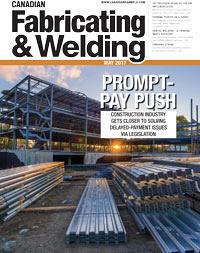Editor
- FMA
- The Fabricator
- FABTECH
- Canadian Metalworking
Prompt-payment push
Efforts federally and provincially to introduce prompt-payment legislation for the construction industry seem close to bearing fruit
- By Rob Colman
- May 15, 2017
- Article
- Fabricating
Editor's Note: Shortly after this story went to press, Bill S-224, discussed here, was passed in the Senate. At this point it’s up to the House of Commons to follow suit in passing the bill.
Everyone expects to be paid for the work that they do within a reasonable amount of time. Any shop owner knows that if the team doesn’t get paid by management regularly, soon enough there won’t be a team in that shop.
And yet delayed payments have become a serious issue for those working in the construction sector. In fact, on April 4 a national delegation of members and associates from the Canadian Institute of Steel Construction (CISC) met with parliamentarians in Ottawa from all political parties during CISC’s “Steel Construction Day on the Hill” to urge them to immediately adopt prompt-payment legislation to address the problem.
Specifically, the CISC was in Ottawa supporting Bill S-224, The Canada Prompt Payment Act, which is designed to ensure prompt payment for federally funded infrastructure projects. The bill was introduced by Senator Donald Plett, the former owner of a heating and ventilation company in Manitoba who understands the issue from the perspective of a subcontractor.
Adjudication Answers
And it’s a serious issue. According to industry data, $46 billion in payments remained unpaid past a 30-day period, which represents about 16 per cent of the estimated $285 billion in annual construction activity in Canada.
“The challenge a trade has, or anyone in the supply chain has – including general contractors – is that if you are not getting paid, there are no ramifications for the person not paying you,” explained Ed Whalen, president of CISC. “And currently there is no mechanism to stop work legally even if you are not being paid. There are many projects right now where trades are stuck continuing to have to perform on a project even though they haven’t been paid in three or four months. If they do stop working, they can be found in default of their contract and face the risk of litigation for delaying a job.”
The proposed legislation states that within a set period, whether it be 30 days or 45 days, everyone is going to expect to be paid for work that is certified. In other words, a trade will put in its invoice, and within an agreed amount of time, the trade will be told if that amount is agreed to. If everything goes well and the work is certified, there should be no delay in payment.
If there is a disagreement about the submission, it quickly goes to adjudication. The adjudicator listens to both sides, makes a ruling, and that ruling is binding.
“If, at the end of the project, you don’t like what the adjudicator made you do, then you can take it to litigation after the fact,” said Whalen.
This adjudication model was based on the U.K.’s prompt-payment model.
“In the U.K., they found that with the adjudication model and prompt payment, recourse to the courts was reduced substantially for litigation on payment issues,” said Whalen. “And less than 5 per cent of adjudicators’ rulings ever went into court at the end of a project.”
A Good Compromise
A couple of key points of prompt-payment legislation are reducing litigation, which ties up courts needlessly, and improving the flow of funds through the industry.
“Presently, with the Construction Lien Act that we have, if you end up with a dispute, it is a five-year dispute,” said Paul Seibel, president of ACL Steel in Kitchener, Ont. “That is how long it is going to take you to get in front of a judge to try to collect your money. That is the problem with it. With prompt payment, you’ve made a deal and you get paid within the terms you’ve negotiated. If those terms aren’t met, I have the right to stop work without being penalized. However, my invoice for the work that I’ve done has to be 100 per cent right. I can’t bill for 80 per cent of the job when I’ve only done 70 per cent. So you have to be very conscious of where you are on a project.”
Seibel’s observation is a key one: The prompt-payment legislation being proposed federally and provincially across Canada has been retooled over time to ensure that it’s a compromise that everyone finds acceptable. In fact, S-224 was retooled in the past few months after the findings of research carried out by the Ontario government, which looked carefully at how governments around the world deal with prompt-payment issues. Canada is lagging on the issue.
Seibel has been involved in efforts to reform the Construction Lien Act in Ontario for many years, and several attempts at passing a bill in Ontario have come up against prorogation, elections, and most recently the premier pulling it back for further study. However, that further study has reaped rewards. Most U.S. states have legislation, as does the U.S. federal government, the U.K., the EU, Australia, and New Zealand. With the adjudication tools and other tweaks Ontario has gleaned from studying these other systems, the bill that is now in front of the senate seems to have reached a stage where it’s not as much if it will pass but when.
Cash Flow Equals Growth Opportunities
Peter Davies, owner of Weldfab Ltd. in Saskatoon, feels that Saskatchewan may yet be the first province to pass legislation. He and other representatives in industry have been busy encouraging their MPPs that this is valuable for the province.
“Anything we can do to speed up payment is a good thing,” said Davies. “Ours is one of the few industries, in my opinion, where we basically operate on our receivables. We finish a job, we send in the invoice at the end of the month, and somebody who doesn’t even know our part of the business might say that they don’t think we are at 40 per cent, they think we are at 30 per cent completion of the job. If we do get approved, the funds still have to get released by the bank. We’re finding it’s closer to 60 days between when we invoice and when we get paid. Meanwhile, we’ve paid to have all the shop drawings done, we’ve ordered all the steel and paid for it, then we fabricate it and pay our staff, and ship the steel to the site. Then, when we do get our cheque, there is a 10 per cent holdback, which is a whole other issue.”
Davies, Seibel, and Whalen all agree that legislation is essential to improve the flow of money and also the flow of work and further development of industry.
“Cash flow is king,” noted Seibel. “If I can pay promptly, I get a better price on my supplies.” In turn, that keeps his business healthier.
And as Whalen points out, the industry provides a lot of good, middle-class jobs for the economy, precisely what the current federal government claims it is determined to strengthen.
The other key point Whalen makes is about keeping people in the industry.
“If you don’t have money to hire apprentices, the whole idea of encouraging the trades isn’t going to work,” said Whalen. “You can’t invest in productivity if someone else has your money.”
Setting An Example
Those not affected by federally funded projects hope that getting this bill through will have a knock-on effect.
“My hope is that with some type of legislation addressing this it will create a new norm for the industry to encourage all projects be paid in a prompt manner,” said Mark Sommerville, general manager at Rampart Steel in Edmonton.
All indications suggest that both at the provincial and federal level efforts are close to bearing fruit on the prompt-payment issue. To learn more about the proposed legislation, connect with your local construction association or CISC.
Editor Robert Colman can be reached at rcolman@canadianfabweld.com.
CISC, 905-604-3231, www.cisc-icca.ca
ACL Steel, 519-568-8822, www.aclsteel.ca
Rampart Steel, 780-465-9730, www.rampartsteel.com
Weldfab, 306-955-4425, www.weldfab.comAbout the Author

Rob Colman
1154 Warden Avenue
Toronto, M1R 0A1 Canada
905-235-0471
Robert Colman has worked as a writer and editor for more than 25 years, covering the needs of a variety of trades. He has been dedicated to the metalworking industry for the past 13 years, serving as editor for Metalworking Production & Purchasing (MP&P) and, since January 2016, the editor of Canadian Fabricating & Welding. He graduated with a B.A. degree from McGill University and a Master’s degree from UBC.
subscribe now


Keep up to date with the latest news, events, and technology for all things metal from our pair of monthly magazines written specifically for Canadian manufacturers!
Start Your Free Subscription- Trending Articles
FMA Annual Meeting: Ingenuity still key with tech innovations

Messer Canada hosts anniversary event

Welding jacket designed for protection, comfort

Gang punching press system accommodates different parts quickly

Compact swing chamber shot blast machine features robotic workpiece handling

- Industry Events
MME Saskatoon
- May 28, 2024
- Saskatoon, SK Canada
CME's Health & Safety Symposium for Manufacturers
- May 29, 2024
- Mississauga, ON Canada
DiPaolo Machine Tools Open House 2024
- June 4 - 5, 2024
- Mississauga, ON Canada
FABTECH Canada
- June 11 - 13, 2024
- Toronto, ON Canada
Zoller Open House & Technology Days 2024
- June 12 - 13, 2024
- Ann Arbor, MI
















